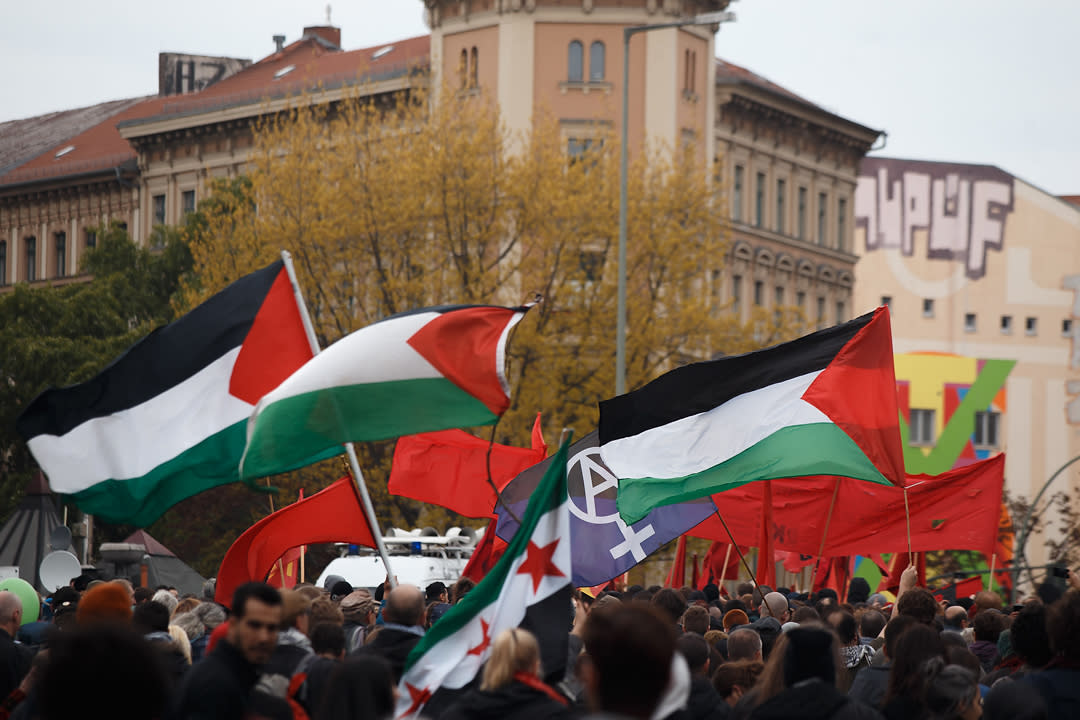
Refuge Worldwide & Gravity Network host photography and awareness workshops
The two sessions take place at RSO on April 25.
Loading

Palästina Kongress repressed | New report on abortion law in Germany | Climate crisis in Colombia
By Staff
Our weekly roundup of stories you may have missed.
Berlin police shut down Palästina Kongress
Pro-Palestine activists faced heavy-handed police repression across Berlin this weekend. The Palaestina Kongress, a three-day event featuring speakers from around the world, was shut down by police just hours after it began on Friday, in a transparent attempt by German authorities to silence criticism of its role in supporting Israel’s genocidal war in Gaza. Several activists were arrested at the venue and one speaker, Dr. Ghassan Abu-Sittah, was detained at Berlin’s BER airport and denied entry to the country. Then on Sunday, activists were assaulted and violently arrested by police at the legal and peaceful occupation ‘Besetzung gegen Besatzung’, outside the Bundestag in Berlin Mitte.
For more info on the Palästina Kongress, read Liv Toerkell’s interview with organisers of the event, or on Tuesday tune in to a panel featuring Yanis Varoufakis and others discussing what happened at the congress. Keep up to date with what's going on at the Bundestag protest camp, which should stay in place for the rest of the week, by following on IG or joining the Telegram group.
Israel continues military assault
Israel has expanded its military bombardment of the entire Gaza strip, just days after Iran launched hundreds of drones and missiles towards Israel in response to the Israeli bombing of Iran’s consulate in Damascus 2 weeks ago. Iran’s attack has drawn widespread condemnation and been described as “unjustifiable” by world leaders, many of whom continue to unconditionally support Israel’s war on Gaza, which has now killed more than 33,000 people.
Steps towards a new government in Haiti
Haiti has announced the formation of a new Presidential Transitional Council in an attempt to reestablish order in the country currently experiencing a humanitarian crisis triggered by intense gang violence. The new council will be charged with choosing a new prime minister and cabinet, filling the power vacuum in Haitian politics that was opened last month by the resignation of Prime Minister Ariel Henry.
95,000 people have fled the Haitian capital and nearly 1 million are on the brink of famine as a result of the latest wave of violence. In a recent article, Al Jazeera reported that gang violence in Haiti is fueled by a steady flow of illegal weapons from the U.S. Rosy Auguste Ducena, a lawyer and programme director at Haiti’s National Human Rights Defense Network, has said: “today, if the United States in particular wants to help Haiti, they can help control what leaves their country,”
Colombia faces water crisis
Bogotá, Colombia, is currently experiencing extreme drought. Authorities have started rationing water, cut off several neighbourhoods from the water grid, and have advised citizens to curb their water use – including asking couples to start showering together. Driven by climate change and the El Niño weather pattern, major droughts are effecting cities across South America. Mexico City has also started rationing water and Guatemala have declared a nationwide emergency to deal with wildfires.
German lawmakers advised to legalise abortion
A newly leaked report by a government-appointed commission in Germany has suggested that lawmakers should legalise abortions in the first 12 weeks of pregnancy. Abortion is currently illegal in Germany except in certain circumstances. Although persecutions are rarely made and abortions are widely available, activists fear that if the law isn’t amended the situation is liable to change rapidly – particularly if the AfD, who advocate for a tightening of abortion restrictions and are rising in the polls, gain more power in the next election.
Abu Ghraib torture case goes to trial
This month marks 20 years since evidence emerged that the U.S. Army and CIA were using horrific torture methods on detainees at the Abu Ghraib prison in Iraq. Starting on 15 April, 3 Iraqi torture victims will now finally have their case heard by a federal court in Virginia. The lawsuit is being brought by the Center for Constitutional Rights against the Virgina-based military contractor CACI, who supplied the interrogators who worked at the prison. Since the Iraq war, the U.S. has continued to rely heavily on private military contractors like CACI, which makes millions every year from the U.S. government.
Header image by Montecruz Foto licensed under CC BY-SA 2.0 DEED.

The two sessions take place at RSO on April 25.

The music industry careers event day takes place on May 16.

A conversation about repression and solidarity with the Palestine Congress organisers.